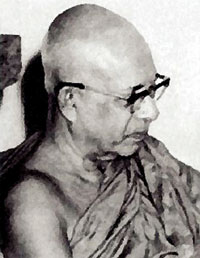Sunday Times 2
Venerable Narada Maha thera – the apostle of Buddhism
View(s):If the Ven. Narada Maha Thera had lived, he would have been 120 years on July 14 this year. He passed away on October 2, 1983 at the ripe age of eighty five.
Though educated in schools run by Christian missionaries, he came under the guidance of the Ven. Pelene Vajiragnana Mahanayake Thera of Vajiraramaya early in his life and entered the Order at the age of 18 as a novice bhikkhu (samanera). He received his higher ordination two years later. During the next 65 years, he devoted his life fulfilling the mission of the Buddha as expounded by him to the first group of disciples after his Enlightenment, “Caratha bhikkhave carikam bahujana hitaya, bahujana sukhaya” — Go forth O monks, for the benefit of the many, for the happiness of the many.”
 I came to know the Ven. Narada Thera as far back as the late forties when we were dhamma students at the Telijjawila Samarasinharamaya, a temple which came under the management of Vajiraramaya in Colombo. A serene quiet place, set against the backdrop of a vast stretch of paddy fields and a hillock, the Ven. Narada used to frequent the place for solitude. It was an ideal place for meditation.While the Ven. Piyadassi Thera headed the Dhamma staff, the Ven. Narada Thera took a keen interest on the daham pasala on his visits. He mixed up with the students, counselled and advised them on various matters. He was keen that the girls wear the half saree and the boys the national dress. He organised the daham pasala’s first prize distribution, for which he invited the then Burmese Ambassador Tung Lang Ong as the chief guest.
I came to know the Ven. Narada Thera as far back as the late forties when we were dhamma students at the Telijjawila Samarasinharamaya, a temple which came under the management of Vajiraramaya in Colombo. A serene quiet place, set against the backdrop of a vast stretch of paddy fields and a hillock, the Ven. Narada used to frequent the place for solitude. It was an ideal place for meditation.While the Ven. Piyadassi Thera headed the Dhamma staff, the Ven. Narada Thera took a keen interest on the daham pasala on his visits. He mixed up with the students, counselled and advised them on various matters. He was keen that the girls wear the half saree and the boys the national dress. He organised the daham pasala’s first prize distribution, for which he invited the then Burmese Ambassador Tung Lang Ong as the chief guest.
The Ven. Narada Thera earned a reputation as an exemplary exponent of the Dhamma and was invited to temples of all the four corners of the island. His way of preaching in his own style and in simple language attracted many devotees.
But his biggest contribution was his missionary work abroad, both in the East and in the West where he carried out the task of propagating the Dhamma, untiringly quenching the thirst of thousands and thousands of people. He was fluent in English and with his deep understanding of the Dhamma his services were much sought after. He took the initiative to set up the London Buddhist Vihara. He travelled to many countries to conduct missionary work: Taiwan, Cambodia, Laos, Vietnam, Singapore, Japan, Nepal, and Australia. In 1956, he visited the United Kingdom and the United States.
His visit to Indonesia in 1934 was the first in 500 years by a Theravada bhikkhu. Altogether he made 15 visits after that. His last visit was in 1983 a few months before his passing away in October. I recall when I met him in Jakarta before his last departure from there, he was so weak and feeble — which reminded me of the last days of the Buddha as described in the Mahaparinibbana sutta.
The time he spent in Indonesia was very fruitful. Due to his initiative, Buddhism was revived, and a number of Theravada temples were opened in Jakarta and outside. A number of Indonesians entered the Order. Borobudur got a fresh recognition. A Bo tree was planted in Borobudur and became a place of worship. He got the Indonesian government to declare full moon day of Vaisak a public holiday and Buddhism one of the recognised religions by the State.
A lay female devotee of Indonesia recorded her emotions in a publication issued in commemoration of the Ven Narada Mahathera’s passing away in the following words: “It was a heartrending separation, a farewell marked with tears from dayakas, dayikas, upaskas, upasikas, followers of many years of his wise teachings. The Ven. Narada Mahathera had become a guru, with a smiling face, serene warm welcoming and ever ready to discuss and answer problems brought to him at every available moment of his time. Children, youths, adults, aged people came and crowded near him to put questions or listened with marked pleasure to his talks.” (Mengenang Ven Narada Mahathera. Page 2.)
The grateful Buddhists of Indonesia in memory of the Ven Narada Mahathera set up a Buddhist library in the main temple in Suntur in the heart of Jakarta.
Dr. P.G. Punchihewa

